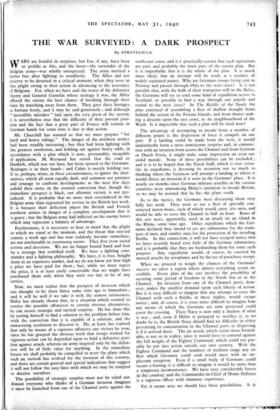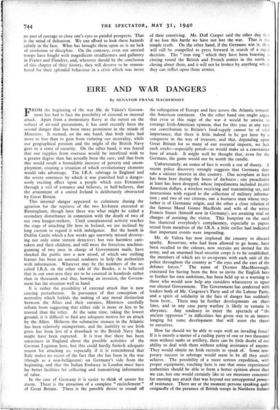THE WAR SURVEYED : A DARK PROSPECT
By STRATEGICUS
WARS are fruitful in surprises, but few, if any, have been so prolific as this, and the latest—the surrender of the Belgian army—was wholly unexpected. The army merited a better fate after fighting so steadfastly. The Allies did not deserve to be deserted in a critical moment, when they were in this plight owing to their action in advancing to the assistance of Belgium. For, when we have said the worst of the defensive theory and General Gamelin whose strategy it was, the Allies offered the enemy the best chance of breaking through their lines by marching away from them. They gave these hostages to fortune freely, and it may be said generously ; and although " incredible mistakes " laid open the very pivot of the system, it is nevertheless true that the difficulty of their present posi- tion and the fact that a great part of France will remain in German hands for some time is due to that action.
Mr. Churchill has warned us that we must prepare " for hard and heavy tidings." The danger of the northern armies had been steadily increasing ; but they had been fighting with the greatest resolution, and holding out against heavy odds, in accordance with a plan which is now, presumably, incapable of application. M. Reynaud has stated that the road to Dunkirk, which was our base, has been opened to the Germans. Boulogne is in their hands ; and Calais is merely holding out. It is, perhaps, wiser, in these circumstances, to ignore the alter- natives, which all seem equally dark, and summon our patience and courage to confront developments as the next few days unfold their story, in the assured conviction that, though the immediate prospect is black, our ultimate victory is not pre- judiced. It is probable that no more men surrendered in the Belgian army than registered for service in the British last week. It is because their defection places the British and French northern armies in danger of a complete envelopment that it is grave ; but the Belgian army had inflicted on the enemy losses which may represent a balance of advantage.
Furthermore, it is necessary td bear in mind' that the plight in which we stand at the moment, and the threat that seemed remote a week ago and has now suddenly become immediate, are not attributable to continuing errors. They flow from initial actions and decisions. We are no longer bound hand and foot by a strategy that stultified itself. We have a fighting com- mander and a fighting philosophy. We have, it is true, bought them in an expensive market, and we do not know yet how high a price we have paid for them ; but, while we must regret the price, it is at least easily conceivable that we might have purchased them only when they were too late to be of any service.
Now, we must realise that the prospect of invasion which was thought to be sheer fancy some time ago is immediate ; and it will be well if we take it with the utmost seriousness.
Hitler has already shown that, in a situation which seemed to restrict the possible offensives to certain obvious alternatives, he can secure strategic and tactical surprise. He has done this by setting himself to find a solution to the problem before him, with the conviction that it is capable of a solution, and the unwavering resolution to discover it. He, at least, has realised that only by means of a vigorous offensive can victory be won, since he has grasped the obvious truth that troops trained for vigorous action can be depended upon to hold a defensive posi- tion against attack, whereas an army inspired only by the defen- sive will be of little value for anything. In the immediate future we shall probably be compelled to meet the plans which such an outlook has evolved for the invasion of this country, and there are certain general and special indications that suggest it will not follow the easy lines with which we may be tempted to deceive ourselves.
The possibility of strategic surprise must not be ruled out. Alniosi everyone who thinks of a German invasion imagines it must be launched from one of the Channel ports against the south-east coast; and it it practically certain that such operations are part, and probably the main part, of the enemy plan. But it is improbable that it is the whole of the plan. It is much more likely that an attempt will be made at a number of widely separated points. Why are Germans troops being sent to Norway and passed through Oslo to the west coast? Is it not possible that, with the bulk of their transports still in the Baltic, the Germans will try to send some kind of expedition across to Scotland, or possibly to find a way through our patrols and round to the west coast? In The Riddle of the Sands the plan consisted of assembling a fleet of shallow draught boats behind the screen of the Frisian Islands, and from thence mak- ing a descent upon the east coast, in the neighbourhood of the Wash. Is it impossible that such a plan will be tried now?
The advantage of attempting to invade from a number of different points is the dispersion of force it compels on our part. If a landing could be made from the west, it would undoubtedly form a most unwelcome surprise and, in conjunc- tion with an invasion from across the Channel and from German or Dutch Frisia, it might make some impression on even our stolid morale. None of these possibilities can be excluded ; and it is to be hoped that the Naval Staff, which is ever versa- tile in expedients, is devoting its attention not so much to thinking where the Germans will attempt a landing as where it would direct an invasion if it were in the Germans' place. It is nearly six months since German military attaches in the various countries were announcing Hitler's intention to invade Britain, so we may be assured that he has the plans ready.
As to the tactics, the Germans were discussing them very fully last week. They were to use a fleet of specially con- structed motor-boats, each of which would carry 200 men, and would be able to cross the Channel in half an hour. Boats of this sort were, apparently, used in an attack on an island in the Rhine, some time ago. Other expedients which the Ger- mans declared they intend to use are submarines for the trans- port of men, and smaller ones for the protection of the invading flotilla. In this connection, it will not have escaped notice that we have recently heard very little of the German submarines, and it is probable that they are husbanding them for some such purpose. Any expedition would, of course, be covered by massed attacks by aeroplanes and by the use of parachute troops.
When we proceed to weigh the chances of the Germans' success we enter a region where almost everything seems in- credible. Every plan of the sort involves the possibility of securing some period of freedom in the North Sea or in the Channel. An invasion from one of the Channel ports, how- ever, makes the smallest demand upon such liberty of action. But it is very difficult to imagine that any attempt to cross the Channel with such a flotilla, in these nights, would escape notice ; and, of course, it is even more difficult to imagine how any means of which the Germans are now possessed could cover the crossing. Their Navy is now only a shadow of what it was ; and, even if Hitler is prepared to sacrifice it, as no doubt he is, the British Navy should find no difficulty in either preventing its concentration in the Channel ports or dispersing it if it arrived there. The air attack, which seems more formid- able, is not so in reality, since it would have to contend against the full weight of the Fighter Command, which could not pos- sibly be put into action outside our own country. With the Fighter Command and the bombers of medium range any air fleet which Germany could send would meet with an un- pleasant reception. Even if a small body of Germans could secure a footing, it is difficult to imagine it would be more than a temporary inconvenience. We have very considerable forces in this country; and the Commander-in-Chief of Home Defence is a vigorous officer with immense experience.
Yet it seems wise we should face these possibilities. It is no part of courage to close one's eyes to painful prospects. That is the mind of defeatism. We can afford to look these hazards calmly in the face. What has brought them upon us is no lack of resolution or discipline. On the contrary, even out untried troops have fought with magnificent steadfastness and gallantry in France and Flanders, and, whatever should be the conclusion of this chapter of their history, they will deserve to be remem- bered for their splendid behaviour in a crisis which was never of their contriving. Mr. Duff Cooper said the other day th t if we lose this battle we have not lost the war. That is the simple truth. On the other hand, if the Germans win it, they will still be compelled to press forward in search of a rapid decision. The " iron ring " which they have been boasting is closing round the British and French armies in the north is closing about them, and it will not be broken by anything which they can inflict upon those armies.































 Previous page
Previous page